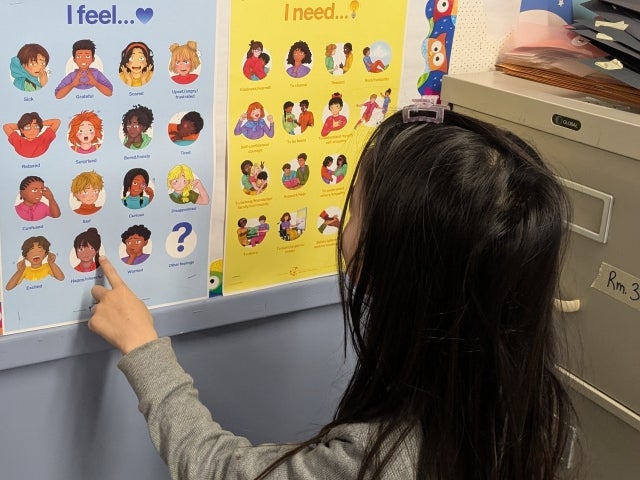SEL complements academic learning at EMSB

Social-emotional learning (SEL) is not a program implemented in schools, nor is it a lesson plan integrated within school curriculums, explains Danika Swanson, Personal Development and Community Involvement consultant for the English Montreal School Board (EMSB). Rather, SEL is an approach to learning in which students are given tools to develop literacy in better understanding and regulating their social and emotional needs, complementing their academic learning.
While teaching children about their emotions is not a new practice, explained Swanson, the Collaborative for Academic and Social-Emotional Learning (CASEL) has legitimized SEL within academic instruction.
US-based CASEL was developed in 1994 by a network of academics and professions, seeking to foster the best practices for teaching
social-emotional literacy to children.
Researchers have since established five defining characteristics of SEL. These include self-awareness, self-management, social awareness, relationship skills and ethical or responsible decision-making.
A Personal Development and Community Involvement animator for the EMSB, Samantha Smith, stresses the importance of integrating SEL into the classroom. Research has found a strong improvement in academic performance and mental health amongst students who are being taught SEL, she explained. “If all of our students are stressed, then their brains are not able to learn.”
While Smith and Swanson both agree that there has always been a need for SEL in schools, the Covid-19 pandemic accentuated its importance.
“The biggest challenges in education [include] attention, decision-making, relationships, performance, well-being,” said Swanson. “All of those things are supported by our ability to regulate emotionally, to feel safe and to feel open to learning.”
In Smith’s experience, SEL is becoming more accepted as a result of the new academic challenges that have emerged since the pandemic. Schools are more open to applying the SEL approach in their teaching, she remarked. “My work was valued in a new way when the pandemic happened.”
SEL is also adapting to teach new competencies, Smith said. In the last five years, CASEL has worked towards tackling systemic inequality andracism in schools. “They’ve really focused on equity and inclusion.”
Smith remains positive that SEL will continue to expand. “I’m hopeful that the Quebec education system will hold onto that and provide time in the schedule, because I feel like they see it and they want it,” she adds.
Hampstead Elementary embraces ‘Me, You and Us’
Hampstead Elementary School of the EMSB is one of many schools that has been applying SEL, an approach adopted in September 2023.
Smith said she saw a need, following the pandemic, for the implementation of SEL- based approaches in other EMSB schools as well, including John Grant High School, St. Monica Elementary School, and most recently, Westmount High School.
“There was a lot more conflict happening,” she said, recalling that she looked for unique ways to help students learn to regulate their emotions.
Smith had previously implemented the Mindful Schools Curriculum at Hampstead. However, as the need for social-emotional learning increased, she looked for alternatives.
“There are many students with different learning abilities, different first languages, different nationalities, and so there’s a large diversity […] and that’s kind of created disagreements,” she said.
In coordination with Swanson, she was introduced to Sophie Langri, co-founder of the Montreal-based Institute of Social Emotional Education and co-creator of the Me, You, Us approach, which was inspired by the CASEL framework and Nonviolent Communication.
Recognizing that the approach could address many of the school’s learning challenges, she presented it to the staff. “I kind of showed them why I felt like it was important,” she said. Smith then began collaborating with teachers and special education technicians at the school, offering training and providing the necessary materials to effectively implement SEL in the classroom.
In September 2023, the Me, You, Us program was launched at Hampstead and focused specifically on teaching students about conflict resolution, allowing them “to communicate in a healthy and bridge-building way,” she explained.
This year, Smith is focused on teaching students to identify, understand and communicate their emotions. “ ‘If you’re mad or sad, what need is not being met in that moment,’ ” Smith asks her students. “That’s been really helpful for some students who never thought about that.”
Smith visits the school once a week, dedicating each month to teaching a specific SEL skill. She also added that SEL approaches align well with the Culture and Citizen curriculum, newly implemented in the Quebec Education Program. “That also has been a way to get teachers a little bit more involved,” she said, adding that some have even begun putting up SEL posters in their classrooms and applying its approaches daily.
The implementation of such a curriculum did not come without its challenges, however. “I’ve had to adapt the curriculum a lot,” said Smith.
“Overall, at Hampstead, I’m noticing more students being able to say how they feel and what they need.” Results are not produced overnight, she added.
While it is rare for Smith to see the impact that SEL has had on her students, she does reflect on one win in particular.
Earlier this year, she reconnected with a former student of hers who had graduated last year from Hampstead. Approaching the student who felt deregulated and overwhelmed at the moment, she asked them to communicate how they were feeling. “I feel mad. I just need space,” the student responded.
Smith said that all her work was worth it, even if it only impacted that one student.









